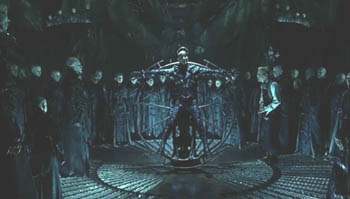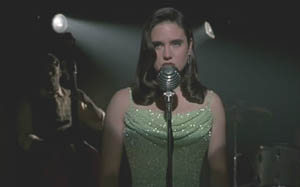|
Belonging to that extremely rarified category of films featuring both Jennifer Connelly and the word "dark" in the title, Dark City, directed by Alex Proyas of the angst-o-thon known as The Crow, is a film wherein space aliens come to screw with our brains. I can say this without fear of ruining things for the reader, because we learn this within the first ten seconds of the film. Herein, partly at least, lies the problem. 
This film is frustrating to me. It's irksome. It's so darn close to the sort of thing I really enjoy that when it trips on its own feet and falls over into a vat of pirhana and starts screaming about getting skeletonized, oh god, help me out of this godforsaken vat, I feel let down. As I sit here typing this up, many years after the film's release, there's an ad on the TV for a new film called Jumper, which looks to be an SF film that's hung its entire premise on a concept which really looks to be insufficient to sustain a whole movie. Dark City doesn't look like that. It does have more than one idea. It does have a visually interesting style. It is, comparatively speaking, unusual. Even what appears on first blush to be a pretty generically boring title ends up having a very specific point. It also, on the other hand, seems to take the easy way out on occasion, including, I feel, in the end. Focusing on a man who wakes up in his bathtub with no memory of what came before that moment, the film follows his attempts to discover who he is and what the hell is happening not only to him, but apparently, with the world at large, which seems to be in all kinds of shit. On top of this, he thinks he might be a serial killer, and so do the cops, which makes his newly-discovered life a rotten pain in the ass. Things seem to look up when he finds he's married to a sultry nightclub singer played by Connelly, but she also suspects him to some degree, and as a result does not pounce on him the way Jennifer Connelly would pounce on any of us were the world in any way fair. To make things just really hard to cope with, these creepy, pale guys who can apparently float start sniffing around after him, who are obviously those aliens we heard about right from the start. The amnesia gag has been done a million and one times before, but it gets used as often as it does because it still works dramatically. Mystery stories are inherently about curiosity, and what could be more curious than one's own misplaced identity? It also ties in effortlessly with the film noir look of the movie, with its hard shadows and trenchcoated detectives. And as if that wasn't enough trouble for our maybe, maybe-not hero, the world he lives in doesn't appear content to sit still and be studied and understood. Every night it rearranges itself into a new configuration, and no one save our protagonist John Murdoch and a perpetually breathless doctor played by Keifer Sutherland are any the wiser. It's because of those aliens, if you haven't figured that out. 
The aliens, called "the strangers," possess a power known as "tuning," with which they can rearrange the structure of the city. This plays out via some really visually cool model effects and large-scale practical effects, along with some morphing and other CG tricks. Murdoch gradually discovers that he too can "tune," via some rather silly-looking CG ripples that shoot out of his forehead, much like Aquaman's pulse-poundingly awesome fish-calling power. Venerated film critic Roger Ebert (who provides a comprehensive and informative commentary track on the DVD) has defended this somewhat hokey approach by asking, "what else would mind power look like?" I would answer that with, "ideally, like nothing at all." Or at least, not like something that so effortlessly calls Aquaman to mind; anything that looks like the director didn't just go with the very first idea pitched by the effects team, instead of then asking, "Okay, that's one way; how else might it look?" There's an imbalance present in this film, with the good ideas getting periodically slapped around by the bad ones, and never quite climbing the whole way back out of that pirhana vat. Also, Jennifer Connelly doesn't play the sultry act the entire time. Boo! Part of the problem is that by introducing the aliens so early on, much of the tension and mystery is undercut. Any time something happens that confuses us, we can easily dismiss it as just being "something them damn aliens are doing." (Apparently, the new DVD director's cut eliminates that opening narration; better late than never, I suppose.) Countless prior examples in fiction have acclimated us to the fact that, in terms of motives or logical plausibility, aliens aren't required to make the slightest bit of sense; hence we never really wonder unduly. What at first looks to be the driving mystery ends up being rather unimportant, and our main character goes from being a man we know nothing about to being a man to whom we can't at all relate. There's style aplenty going on here, but it's too shy on character development for us to really care how things finally turn out. And by "us," I of course mean "me." There's plenty of other people who love this film. This isn't a bad film. It's far from a bad film. It's boatloads better than The Matrix, with which it is frequently compared, for example. It's most assuredly shitloads better than the film which just was advertised on the TV, a remake of 10,000 BC by Roland Emmerich-why do people keep giving that hack money? WHY? So yeah. Dark City does peek its head up above the crowd. But it could've really stuck it high up there, and that discrepancy just leaves me lamenting what it could have been. Oh, yeah. And anyone who tries to say that the secret to understanding human nature can't be found in the brain is either a liar or a superstitious idiot. A little more science, please, and a little less fiction. -review by Matt Murray
|
|
||||||||